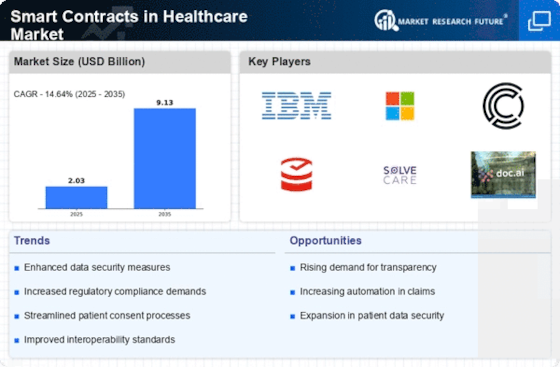-
Executive Summary
-
Market Attractiveness Analysis
- Smart Contracts Healthcare Market, by Blockchain Platform
- Smart Contracts Healthcare Market, by Application
- Smart Contracts Healthcare Market, by End user
- Smart Contracts in Healthcare Smart Contracts Healthcare Market, by Region
-
Scope of the Report
-
Market Definition
-
Scope of the Study
-
Market Structure
-
Market Research Methodology
-
Research Process
-
Primary Research
-
Secondary Research
-
Market Size Estimation
-
Forecast Model
-
List of Assumptions
-
Market Insights
-
Industry Overview of the Global Smart Contracts in Healthcare Market
-
Introduction
-
Drivers
- Drivers: Impact Analysis
-
Restraints
- Restraints: Impact Analysis
-
Opportunities
-
Market Factor Analysis
-
Porter’s Five Forces Analysis
- Threat of New Entrants
- Bargaining Power of Suppliers
- Bargaining Power of Buyers
- Threat of Substitutes
- Intensity of Rivalry
-
Value Chain/Supply Chain of the Global Smart Contracts in Healthcare Market
-
Global Smart Contracts in Healthcare Smart Contracts Healthcare Market, by Blockchain Platform
-
Introduction
-
Ethereum
- Market Estimates & Forecast, 2020–2027
- Market Estimates & Smart Contracts Healthcare Market, by Region, 2020–2027
-
Bitcoin
- Market Estimates & Forecast, 2020–2027
- Market Estimates & Smart Contracts Healthcare Market, by Region, 2020–2027
-
NXT
- Market Estimates & Forecast, 2020–2027
- Market Estimates & Smart Contracts Healthcare Market, by Region, 2020–2027
-
Sidechains
- Market Estimates & Forecast, 2020–2027
- Market Estimates & Smart Contracts Healthcare Market, by Region, 2020–2027
-
Global Smart Contracts in Healthcare Smart Contracts Healthcare Market, by End user
-
Introduction
-
Pharmaceutical Companies
- Market Estimates & Forecast, 2020–2027
- Market Estimates & Smart Contracts Healthcare Market, by Region, 2020–2027
-
Healthcare Providers
- Market Estimates & Forecast, 2020–2027
- Market Estimates & Smart Contracts Healthcare Market, by Region, 2020–2027
-
Healthcare Payers
- Market Estimates & Forecast, 2020–2027
- Market Estimates & Smart Contracts Healthcare Market, by Region, 2020–2027
-
Other End Users
- Market Estimates & Forecast, 2020–2027
- Market Estimates & Smart Contracts Healthcare Market, by Region, 2020–2027
-
Global Smart Contracts in Healthcare Smart Contracts Healthcare Market, by Application
-
Introduction
-
Patient Data Management
- Market Estimates & Forecast, 2020–2027
- Market Estimates & Smart Contracts Healthcare Market, by Region, 2020–2027
-
Electronic Health Records (EHRS)
- Market Estimates & Forecast, 2020–2027
- Market Estimates & Smart Contracts Healthcare Market, by Region, 2020–2027
-
Supply Chain Management
- Market Estimates & Forecast, 2020–2027
- Market Estimates & Smart Contracts Healthcare Market, by Region, 2020–2027
-
Clinical Data Exchange and Interoperability
- Market Estimates & Forecast, 2020–2027
- Market Estimates & Smart Contracts Healthcare Market, by Region, 2020–2027
-
Claims Adjudication and Billing Management
- Market Estimates & Forecast, 2020–2027
- Market Estimates & Smart Contracts Healthcare Market, by Region, 2020–2027
-
Others
- Market Estimates & Forecast, 2020–2027
- Market Estimates & Smart Contracts Healthcare Market, by Region, 2020–2027
-
Global Smart Contracts in Healthcare Smart Contracts Healthcare Market, by Region
-
Introduction
-
North America
- Market Estimates & Smart Contracts Healthcare Market, by Country, 2020–2027
- Market Estimates & Smart Contracts Healthcare Market, by Blockchain Platform, 2020–2027
- Market Estimates & Smart Contracts Healthcare Market, by Application, 2020–2027
- Market Estimates & Smart Contracts Healthcare Market, by End user, 2020–2027
- US
- Canada
- Mexico
-
Europe
- Market Estimates & Smart Contracts Healthcare Market, by Country, 2020–2027
- Market Estimates & Smart Contracts Healthcare Market, by Blockchain Platform, 2020–2027
- Market Estimates & Smart Contracts Healthcare Market, by Application, 2020–2027
- Market Estimates & Smart Contracts Healthcare Market, by End user, 2020–2027
- Germany
- France
- UK
- Rest of Europe
-
Asia-Pacific
- Market Estimates & Smart Contracts Healthcare Market, by Country, 2020–2027
- Market Estimates & Smart Contracts Healthcare Market, by Blockchain Platform, 2020–2027
- Market Estimates & Smart Contracts Healthcare Market, by Application, 2020–2027
- Market Estimates & Smart Contracts Healthcare Market, by End user, 2020–2027
- China
- India
- Japan
- Rest of Asia-Pacific
-
Middle East & Africa
- Market Estimates & Smart Contracts Healthcare Market, by Blockchain Platform, 2020–2027
- Market Estimates & Smart Contracts Healthcare Market, by Application, 2020–2027
- Market Estimates & Smart Contracts Healthcare Market, by End user, 2020–2027
-
South America
- Market Estimates & Smart Contracts Healthcare Market, by Blockchain Platform, 2020–2027
- Market Estimates & Smart Contracts Healthcare Market, by Application, 2020–2027
- Market Estimates & Smart Contracts Healthcare Market, by End user, 2020–2027
-
Company Landscape
-
Competitive Overview
-
Competitor Dashboard
-
Major Growth Strategies in the Global Smart Contracts in Healthcare Market
-
Competitive Benchmarking
-
Vendor Share Analysis
-
XXXX: The leading player in terms of number of developments in the Global Smart Contracts in Healthcare Market
-
Key Developments & Growth Strategies
- Product Launches/Service Deployment
- Mergers & Acquisitions
- Joint Ventures
- Business Expansion
-
Company Profiles
-
IBM Corporation.
- Company Overview
- Product/Business Segment Overview
- Financial Updates
- Key Developments
- Key Strategies
-
Patientory.
- Company Overview
- Product/Business Segment Overview
- Financial Updates
- Key Developments
- Key Strategies
-
Factom.
- Company Overview
- Product/Business Segment Overview
- Financial Updates
- Key Developments
- Key Strategies
-
Proof.Work.
- Company Overview
- Product/Business Segment Overview
- Financial Updates
- Key Developments
- Key Strategies
-
SimplyVital Health
- Company Overview
- Product/Business Segment Overview
- Financial Updates
- Key Developments
- Key Strategies
-
Gem
- Company Overview
- Product/Business Segment Overview
- Financial Updates
- Key Developments
- Key Strategies
-
PokitDok, Inc
- Company Overview
- Product/Business Segment Overview
- Financial Updates
- Key Developments
- Key Strategies
-
Hashed Health
- Company Overview
- Product/Business Segment Overview
- Financial Updates
- Key Developments
- Key Strategies
-
Chronicled
- Company Overview
- Product/Business Segment Overview
- Financial Updates
- Key Developments
- Key Strategies
-
smartData Enterprises.
- Company Overview
- Product/Business Segment Overview
- Financial Updates
- Key Developments
- Key Strategies
-
iSolve
- Company Overview
- Product/Business Segment Overview
- Financial Updates
- Key Developments
- Key Strategies
-
FarmaTrust
- Company Overview
- Product/Business Segment Overview
- Financial Updates
- Key Developments
- Key Strategies
-
Blockpharma
- Company Overview
- Product/Business Segment Overview
- Financial Updates
- Key Developments
- Key Strategies
-
Microsoft Corporation
- Company Overview
- Product/Business Segment Overview
- Financial Updates
- Key Developments
- Key Strategies
-
Guardtime
- Company Overview
- Product/Business Segment Overview
- Financial Updates
- Key Developments
- Key Strategies
-
Medicalchain
- Company Overview
- Product/Business Segment Overview
- Financial Updates
- Key Developments
- Key Strategies
-
LIST OF TABLES
-
Global Smart Contracts in Healthcare Smart Contracts Healthcare Market, by Region, 2020–2027
-
North America: Smart Contracts in Healthcare Smart Contracts Healthcare Market, by Country, 2020–2027
-
Europe: Smart Contracts in Healthcare Smart Contracts Healthcare Market, by Country, 2020–2027
-
Asia-Pacific: Smart Contracts in Healthcare Smart Contracts Healthcare Market, by Country, 2020–2027
-
Middle East & Africa: Smart Contracts in Healthcare Smart Contracts Healthcare Market, by Country, 2020–2027
-
South America: Smart Contracts in Healthcare Smart Contracts Healthcare Market, by Country, 2020–2027
-
Global Smart Contracts in Healthcare Smart Contracts Healthcare Market, by Region, 2020–2027
-
North America: Smart Contracts in Healthcare Smart Contracts Healthcare Market, by Country, 2020–2027
-
Europe: Smart Contracts in Healthcare Smart Contracts Healthcare Market, by Country, 2020–2027
-
Table10 Asia-Pacific: Smart Contracts in Healthcare Smart Contracts Healthcare Market, by Country, 2020–2027
-
Table11 Middle East & Africa: Smart Contracts in Healthcare Smart Contracts Healthcare Market, by Country, 2020–2027
-
Table12 South America: Smart Contracts in Healthcare Smart Contracts Healthcare Market, by Country, 2020–2027
-
Table13 Global Smart Contracts in Healthcare Smart Contracts Healthcare Market, by Region, 2020–2027
-
Table14 North America: Smart Contracts in Healthcare Smart Contracts Healthcare Market, by Country, 2020–2027
-
Table15 Europe: Smart Contracts in Healthcare Smart Contracts Healthcare Market, by Country, 2020–2027
-
Table16 Asia-Pacific: Smart Contracts in Healthcare Smart Contracts Healthcare Market, by Country, 2020–2027
-
Table17 Middle East & Africa: Smart Contracts in Healthcare Smart Contracts Healthcare Market, by Country, 2020–2027
-
Table18 South America: Smart Contracts in Healthcare Smart Contracts Healthcare Market, by Country, 2020–2027
-
Table19 Global Smart Contracts in Healthcare Smart Contracts Healthcare Market, by Region, 2020–2027
-
Table20 North America: Smart Contracts in Healthcare Smart Contracts Healthcare Market, by Country, 2020–2027
-
Table21 Europe: Smart Contracts in Healthcare Smart Contracts Healthcare Market, by Country, 2020–2027
-
Table22 Asia-Pacific: Smart Contracts in Healthcare Smart Contracts Healthcare Market, by Country, 2020–2027
-
Table23 Middle East & Africa: Smart Contracts in Healthcare Smart Contracts Healthcare Market, by Country, 2020–2027
-
Table24 South America: Smart Contracts in Healthcare Smart Contracts Healthcare Market, by Country, 2020–2027
-
LIST OF FIGURES
-
Global Smart Contracts in Healthcare Market Segmentation
-
Forecast Methodology
-
Porter’s Five Forces Analysis of the Global Smart Contracts in Healthcare Market
-
Value Chain of the Global Smart Contracts in Healthcare Market
-
Share of the Global Smart Contracts in Healthcare Smart Contracts Healthcare Market, by Country, 2020 (in %)
-
Global Smart Contracts in Healthcare Market, 2020–2027
-
Sub-Segments of Type
-
Global Smart Contracts in Healthcare Smart Contracts Healthcare Market, by Blockchain Platform, 2020
-
Share of the Global Smart Contracts in Healthcare Smart Contracts Healthcare Market, by Blockchain Platform, 2020–2027
-
Global Smart Contracts in Healthcare Smart Contracts Healthcare Market, by Application, 2020
-
Share of Global Smart Contracts in Healthcare Smart Contracts Healthcare Market, by Application, 2020–2027
-
Global Smart Contracts in Healthcare Smart Contracts Healthcare Market, by End user, 2020–2027
-
Share of Global Smart Contracts in Healthcare Smart Contracts Healthcare Market, by End user 2020–2027


















Leave a Comment